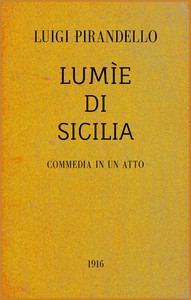Lumìe di Sicilia: Commedia in un atto by Luigi Pirandello
"Lumìe di Sicilia: Commedia in un atto" by Luigi Pirandello is a one-act play written in 1910. Micuccio Bonavino has sacrificed everything to support Teresina's singing career, remembering her as the simple Sicilian girl who loved him. When he arrives unannounced at her luxurious home in northern Italy, he discovers how fame and time have transformed her beyond recognition. The play explores how memories crystallize while people change, and how love can
die in one heart while still burning in another. (This is an automatically generated summary.)
Read or download for free
| Reading Options | Url | Size | |||
|---|---|---|---|---|---|
| Read now! | https://www.gutenberg.org/ebooks/64845.html.images | 71 kB | |||
| EPUB3 (E-readers incl. Send-to-Kindle) | https://www.gutenberg.org/ebooks/64845.epub3.images | 276 kB | |||
| EPUB (older E-readers) | https://www.gutenberg.org/ebooks/64845.epub.images | 276 kB | |||
| EPUB (no images, older E-readers) | https://www.gutenberg.org/ebooks/64845.epub.noimages | 92 kB | |||
| Kindle | https://www.gutenberg.org/ebooks/64845.kf8.images | 313 kB | |||
| older Kindles | https://www.gutenberg.org/ebooks/64845.kindle.images | 305 kB | |||
| Plain Text UTF-8 | https://www.gutenberg.org/ebooks/64845.txt.utf-8 | 54 kB | |||
| Download HTML (zip) | https://www.gutenberg.org/cache/epub/64845/pg64845-h.zip | 294 kB | |||
| There may be more files related to this item. | |||||
Similar Books
About this eBook
| Author | Pirandello, Luigi, 1867-1936 |
|---|---|
| Title | Lumìe di Sicilia: Commedia in un atto |
| Note | Wikipedia page about this book: it.wikipedia.org/wiki/Lumie_di_Sicilia |
| Credits | Barbara Magni |
| Reading Level | Reading ease score: 63.0 (8th & 9th grade). Neither easy nor difficult to read. |
| Language | Italian |
| LoC Class | PQ: Language and Literatures: Romance literatures: French, Italian, Spanish, Portuguese |
| Subject | Comedy plays |
| Subject | Italian drama -- 20th century |
| Category | Text |
| EBook-No. | 64845 |
| Release Date | Mar 17, 2021 |
| Most Recently Updated | Oct 18, 2024 |
| Copyright Status | Public domain in the USA. |
| Downloads | 319 downloads in the last 30 days. |
| Project Gutenberg eBooks are always free! | |

